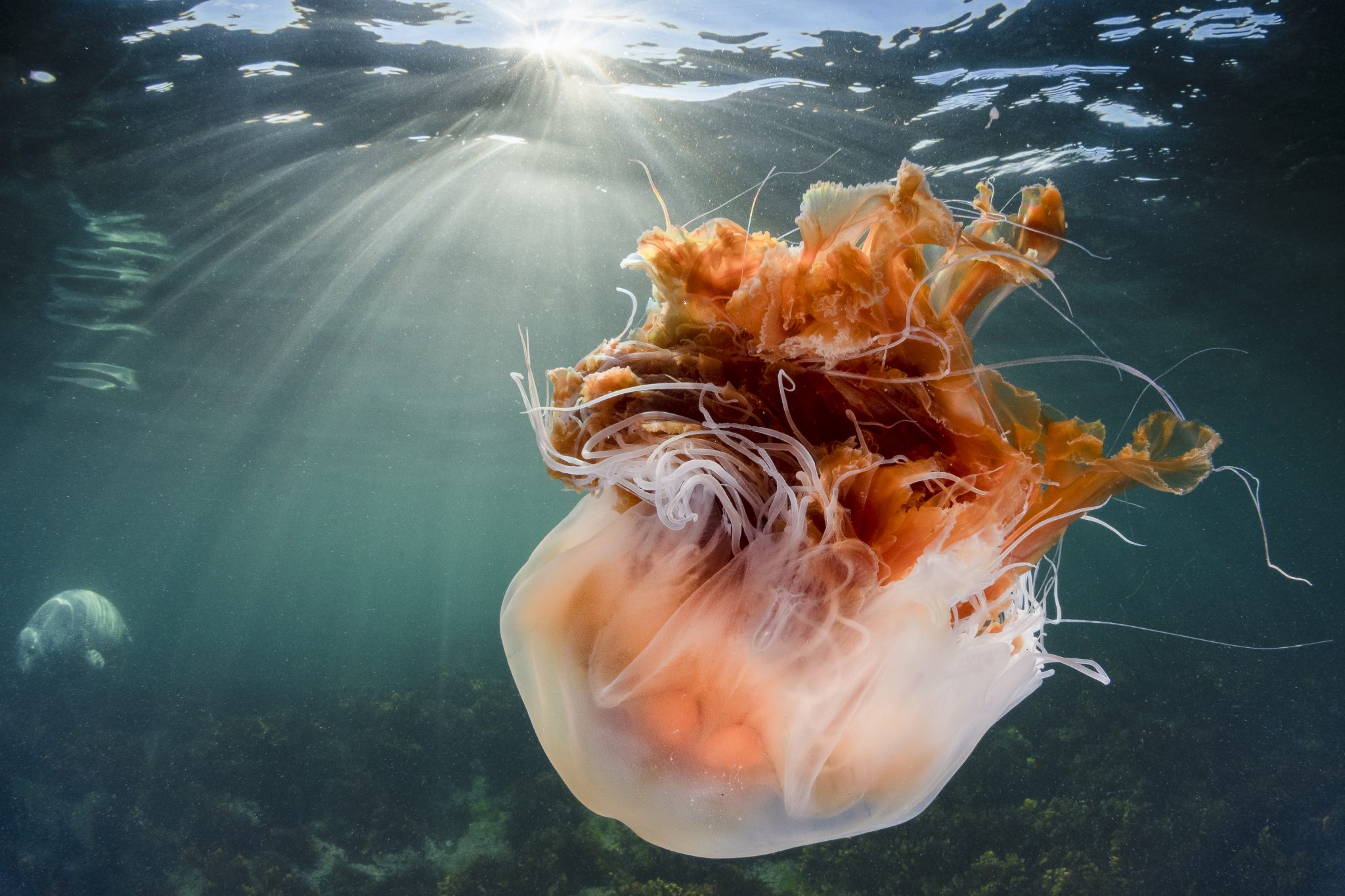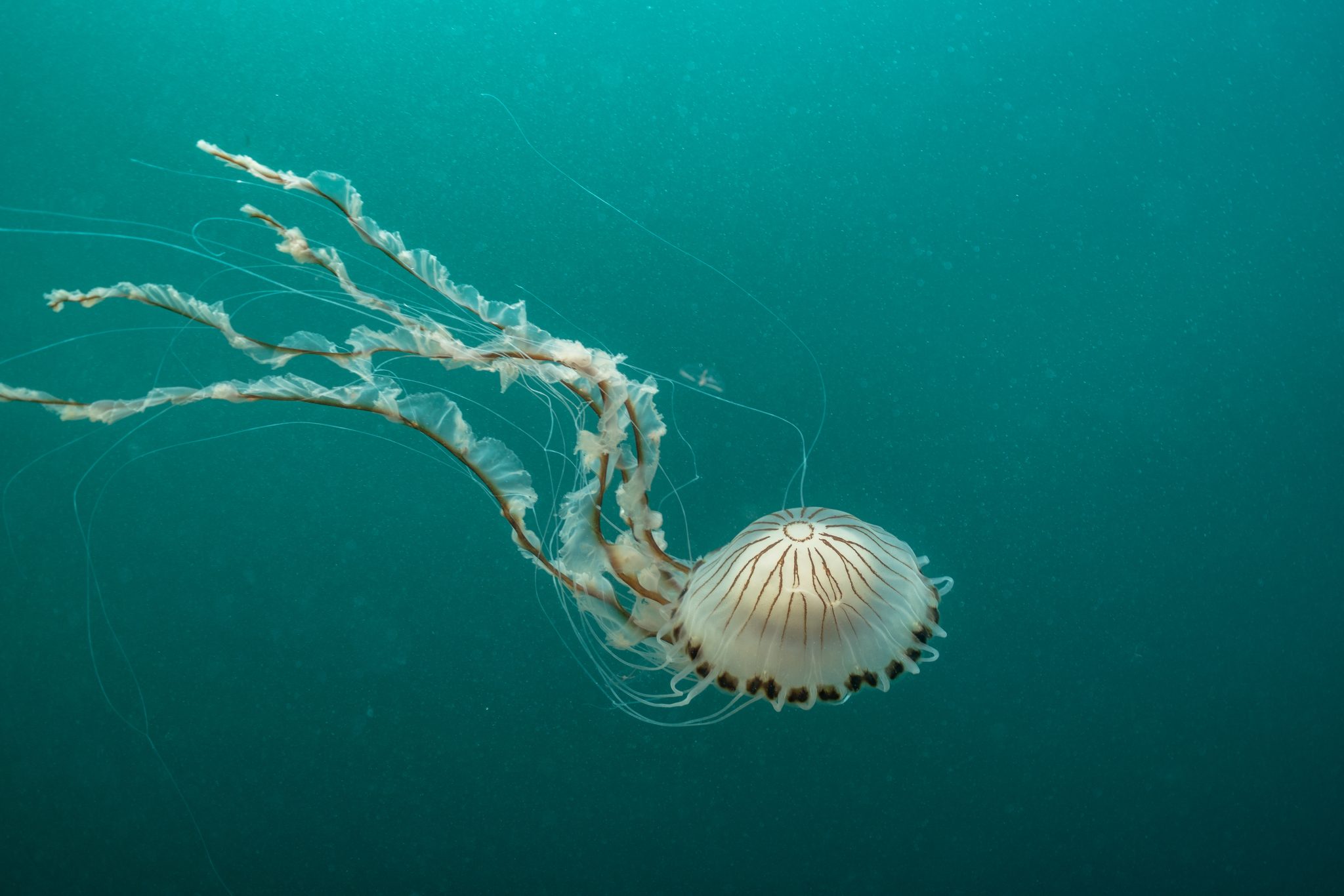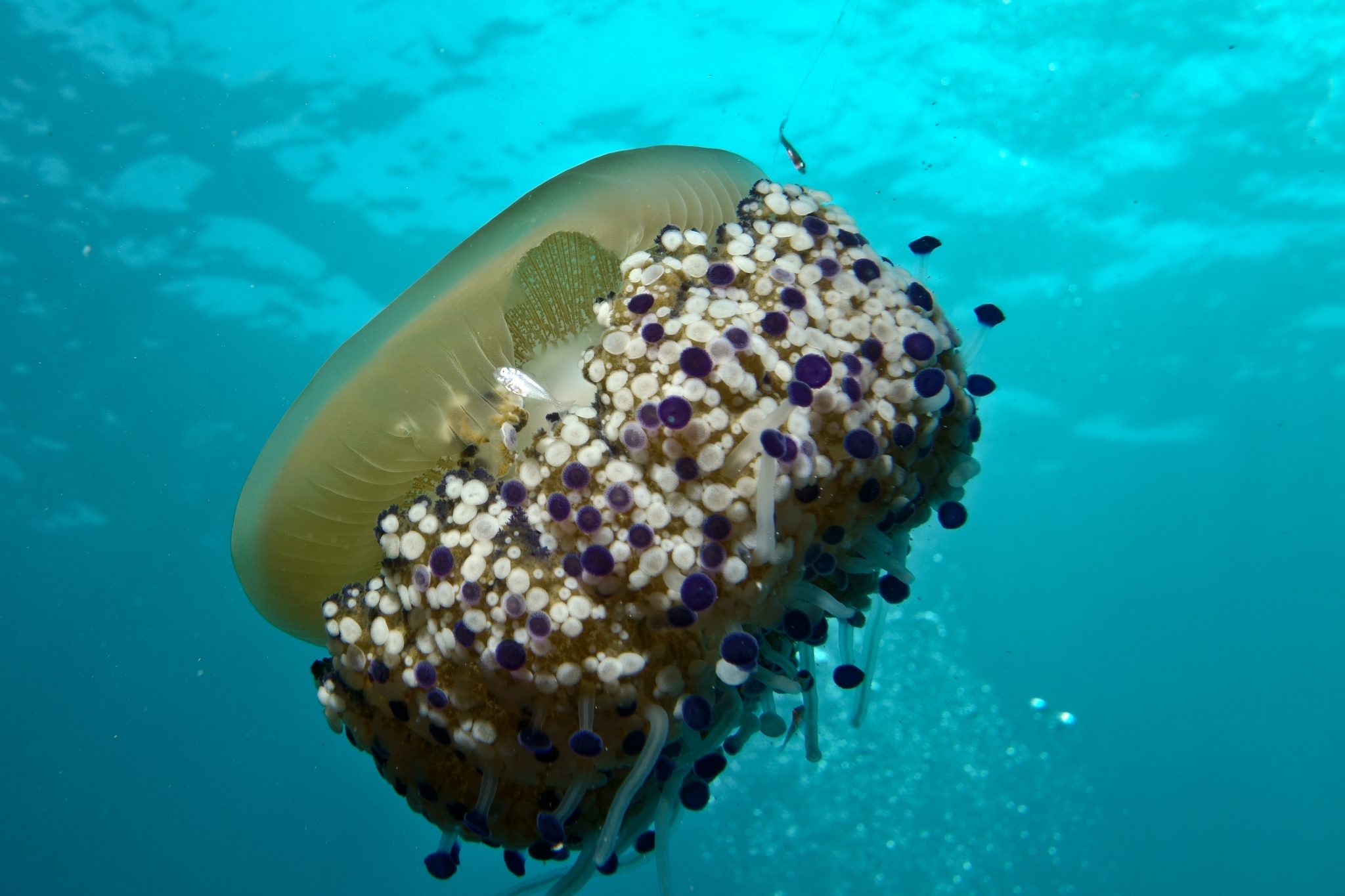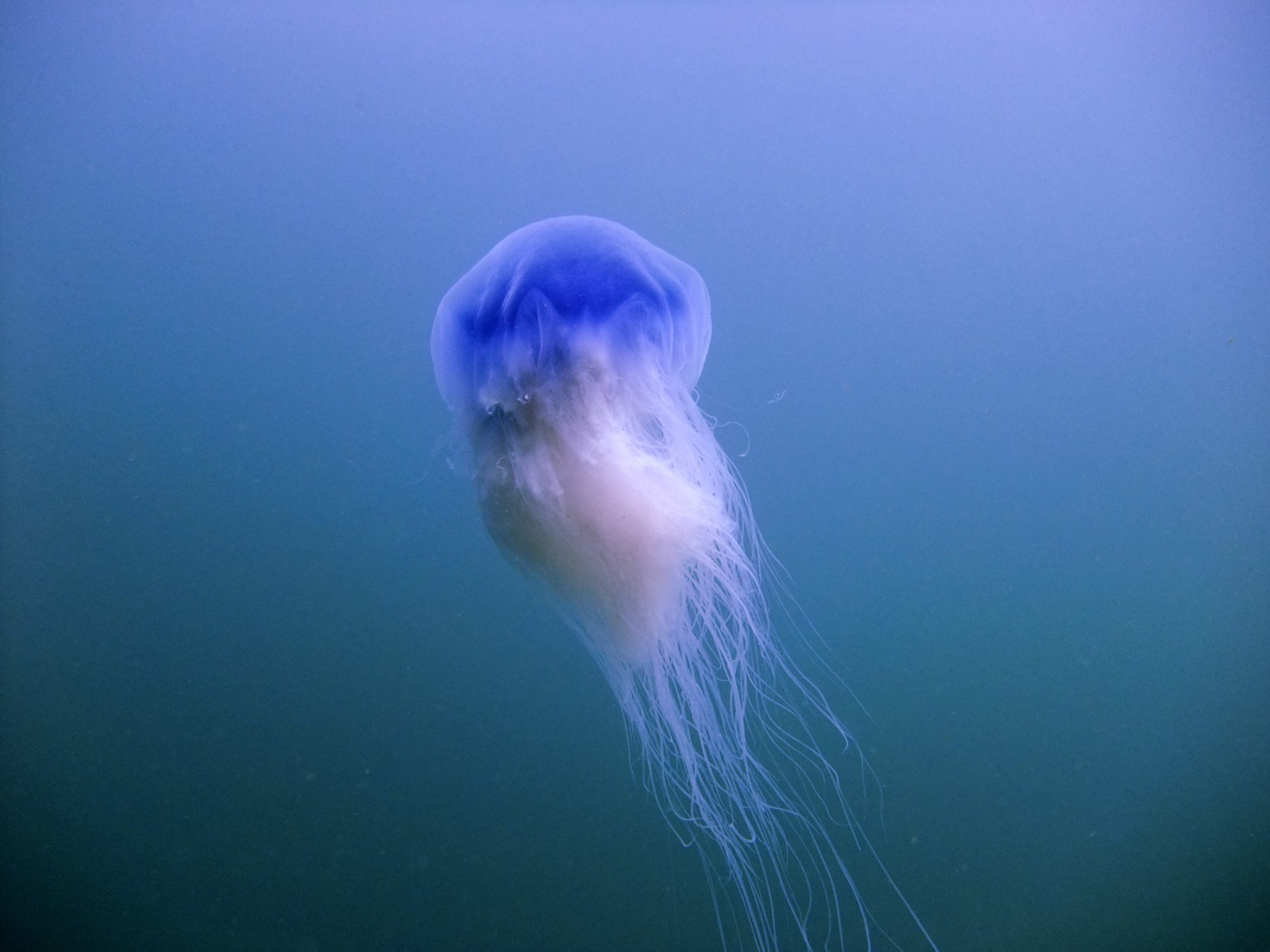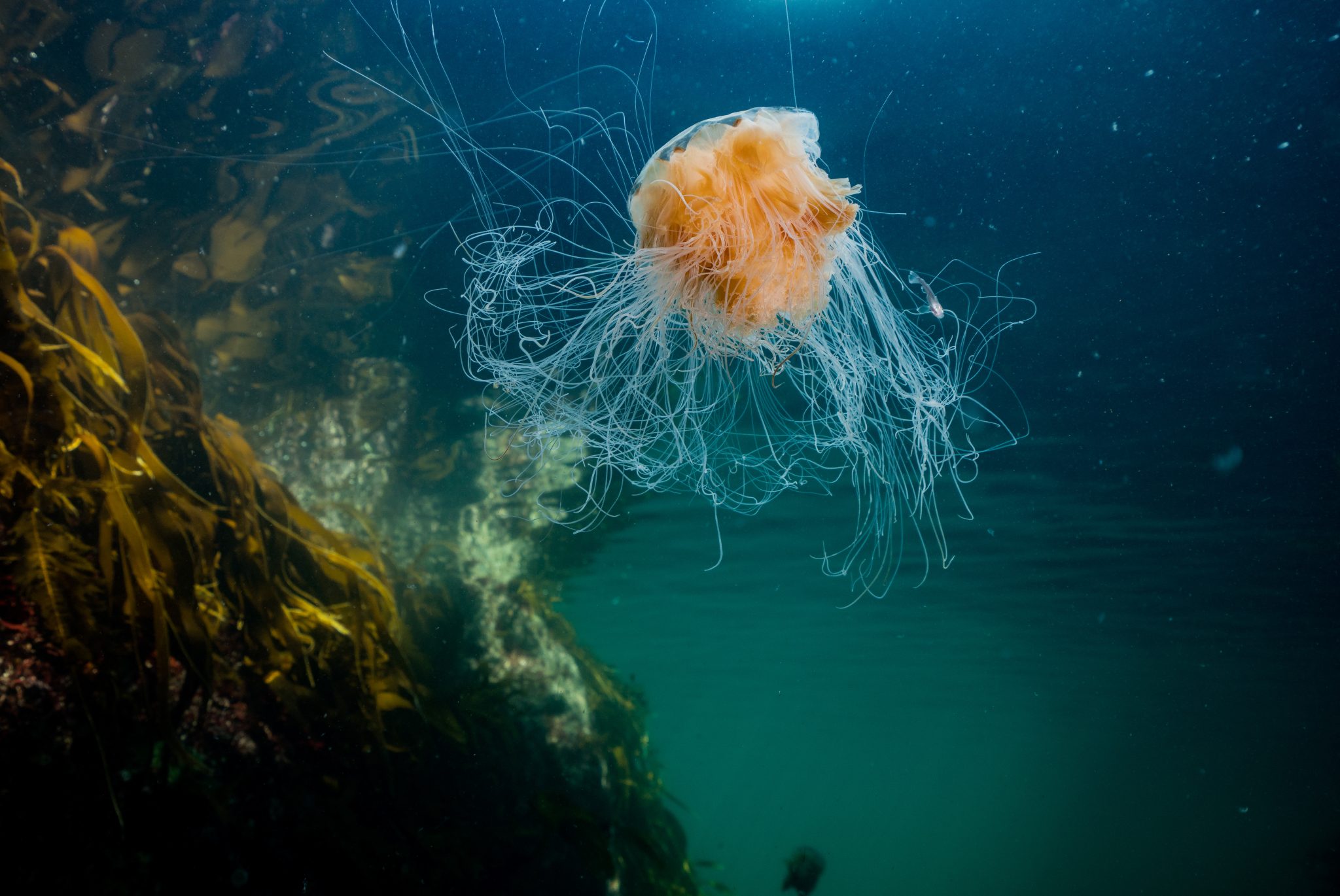Marine Life & Conservation
Marine Conservation Society’s report shows increase in jellyfish sightings on UK and Irish shores
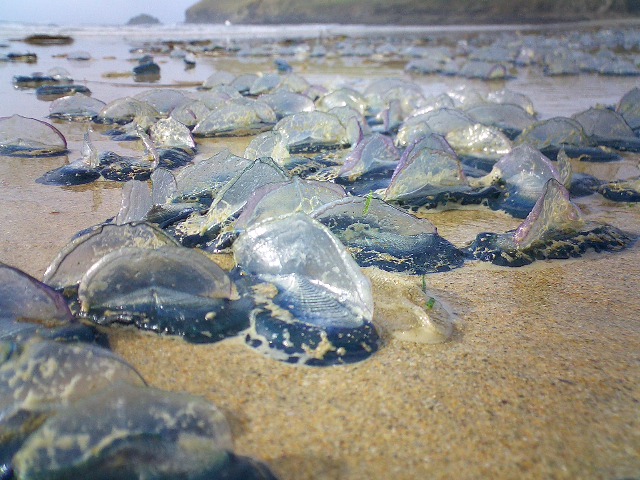
The Marine Conservation Society has released its annual Wildlife Sightings report, marking World Jellyfish Day on Friday 3rd November.
The charity’s wildlife sightings project focusses on gathering reports of jellyfish and marine turtles, which feed on jellyfish. These two marine animals are both vital in supporting ocean biodiversity and are indicators of changes in our ocean over time, like warming waters. The charity’s report provides a detailed breakdown of the species observed, revealing the diversity of jellyfish in UK and Irish waters.
This year’s report (covering 1st October 2022 to 30th September 2023) shows a 32% increase in jellyfish sightings compared to the previous year.
Jellyfish can be spotted year-round in UK and Irish seas, but larger blooms are more likely to appear in spring, lasting through until autumn. The Marine Conservation Society’s report shows 75% of sightings were of individuals (1-20), whilst 11% of sightings were of large blooms of over 100 individuals, an increase of 57% from last year.
Research has suggested that an increase in some jellyfish numbers around UK could be related to climate change, however, currently there isn’t enough evidence to make this link. The Marine Conservation Society’s Wildlife Sightings programme aims to collect long term data which can be used as a reference to study the reality of jellyfish trends in UK waters.
Dr Peter Richardson, Head of Ocean Recovery at the Marine Conservation Society, said, “Jellyfish populations are highly variable year on year, and depend on several environmental factors that are different each year, such as sea temperatures and storms. Numbers of sightings we receive can also depend on the awareness of our sightings programme and the ‘wow factor’ of jellyfish people encounter.
“This year seems to have been a particularly good year for barrel jellyfish – one of our chunkiest jellyfish species that can occur in mind-boggling numbers when conditions are favourable. It’s only by observing trends over many years that we can start to suggest reasons for change.”
The most frequently reported species during the reporting period was the barrel jellyfish, which accounted for almost 27% of total sightings (467). This is an increase of 21% compared to the previous year’s results, when it was the sixth most-spotted species. Barrel jellyfish are sometimes called ‘dustbin lid jellyfish’ due to their large size – they can grow up to one metre in diameter. They have a solid, spherical, rubbery-looking bell which can be white, pale pink, blue or yellow. Rather than tentacles, barrel jellyfish have eight thick, frilled arms.
The report features other intriguing jellyfish-like species, including crystal and comb jellies, and sea gooseberries, which made up 10% of the total sightings this year. Crystal jellyfish were the most reported ‘other’ species, accounting for 3.2% of all sightings.
The Marine Conservation Society also records reports of marine turtles, which feed on jellyfish. The charity’s volunteers submitted 12 reports of marine turtle sightings this year, four of which were live leatherbacks. Turtle sightings contribute to a national database.
Six of the world’s seven marine turtle species have been spotted in UK and Irish seas. The leatherback turtle is most likely to be spotted feeding on our jellyfish during the summer months., while stray juvenile loggerheads are usually encountered washed up in winter. The leatherback, which is the largest sea turtle, and loggerheads are considered to be of ‘vulnerable’ conservation status. Reporting sightings of these incredible creatures will support the Marine Conservation Society and others in understanding their movements, potential threats and how better to protect them through policies and conservation strategies.
Other turtle species are swept into UK and Irish seas by strong winds and currents, though more suited to warmer waters. The charity’s Turtle Code provides advice on what to do if a beached turtle is found.
Justine Millard, Head of Volunteering and Citizen Science at the Marine Conservation Society, said, “The data on jellyfish and turtles that volunteers submit plays a vital role in understanding the changes occurring in our marine ecosystems, and help us to protect our seas. We urge anyone who has spotted a jellyfish or turtle to report it to us to continue to build a picture of our seas and the incredible life within them. A huge thanks to all the volunteers who have submitted data to us this past year.”
The Marine Conservation Society uses wildlife sightings by citizen scientists to:
- Discover how jellyfish and turtle populations are changing around the UK – specifically when and where they are occurring each year
- Investigate trends in turtle sightings to find out more about how they use our waters
- Explore whether jellyfish distribution can tell us more about where leatherback turtle feeding grounds may be
For more information on how to identify jellyfish and turtles, and to report a sighting, please visit the Marine Conservation Society’s website: www.mcsuk.org/sightings.
Marine Life & Conservation
Shark Trust launches Oceanic 31 Shark Art Auction

 After a two-year tour of UK art galleries, community spaces and aquariums, the Shark Trust’s acclaimed Oceanic31 exhibition takes its final bow at the Royal Geographical Society later this month. And the unique collection of artwork, depicting 31 species of oceanic sharks and rays, donated by 31 artists, is now open for bids from art lovers and shark enthusiasts. The online auction, launched today, will close on the 7th December at 8pm (BST). The money raised will support the Shark Trust Oceanics Programme.
After a two-year tour of UK art galleries, community spaces and aquariums, the Shark Trust’s acclaimed Oceanic31 exhibition takes its final bow at the Royal Geographical Society later this month. And the unique collection of artwork, depicting 31 species of oceanic sharks and rays, donated by 31 artists, is now open for bids from art lovers and shark enthusiasts. The online auction, launched today, will close on the 7th December at 8pm (BST). The money raised will support the Shark Trust Oceanics Programme.
People can now bid on 27 of the artworks by visiting this website:
https://superstars-auctions.com/sharktrustauction
It is a chance to own a beautiful piece of original art and to support the Shark Trust. The timing of the auction also means that these would make a very special Christmas gift for any shark-lover.
- Bigeye Thresher Shark by Janina Rossiter
- Carcharodon carcharias by Jimmy Higgs
- Croc VR 2030 by Tom Mead
- Oceanic Whitetip by ATM
- Silky Street by ScapaJoe
The diversity of pieces mirrors that of the sharks and rays they represent. You can bid on paintings, digital creations, sculptures, mixed media and more. You can pick your favourite artist or species of shark. Or you can select the perfect artwork to make a statement in your home or office. Whichever you choose, you will be supporting the work to protect these amazing animals.
One of the pieces of art has been selected to be auctioned live by Steve Backshall at the For the Love of Sharks event at the Royal Geographical Society in London on the 29th November. In addition to this, two further pieces will be raffled at this event, giving people a chance to win an incredible piece of shark art. For the Love of Sharks is the Shark Trust’s flagship evening. A night to celebrate sharks. Steve Backshall is the headline speaker at this event that will see other prominent shark advocates join him on stage.
Tickets for the event can be snapped up here:
https://thesharktrust.org.uk/Event/flos24
Those that would like to see the Oceanic 31 exhibition have one final chance. It is being displayed at the Pavilion at the Royal Geographic Society from 26th November until the 7th December. Entry is free.
Find out more here:
https://www.rgs.org/events/upcoming-events/oceanic-31
Paul Cox, Shark Trust CEO, Said “This exhibition has given us the opportunity to reach out to a new audience. And inspire more people with the wonderful sharks and rays on which our Big Shark Pledge campaign is based. We are immensely grateful to the 31 artists who have worked so hard to create these works.”
Bid for your favourite Oceanic 31 artwork here:
https://superstars-auctions.com/sharktrustauction
Banner Image: Smooth Hammerhead by Alicia Hayden
Marine Life & Conservation
Meet Steve Backshall in the Bite-Back Prize Draw

Until 28 November, prizes worth a massive £10,000 – including experiences, products and tuition – feature in a line-up of items that can be won for £5 in an online prize draw to celebrate Bite-Back Shark & Marine Conservation’s 20th anniversary and help generate crucial funds for the future.
Top of the list of prizes is the chance to spend time with adventurer and wildlife expert Steve Backshall, a workout session with Nat Geo star Aldo Kane, a kayaking trip alongside white-water expert and diver Sal Montgomery and a Zoom call with ‘shark whisperer’ Cristina Zenato.
On top of that, some of the most admired companies in the diving and scuba industry have been quick to support the charity with fabulous prizes that make the £5 ticket price worth more than just a flutter.
Master Liveaboards, BSAC, Midlands Diving Chamber, Go Freediving and Blue Shark Snorkel have all generously donated experience prizes, while celebrated photographer Alex Mustard has donated a print and artists Scott Gleed and Olivier Leger have donated a sculpture and illustration to help boost the fundraising pot.
Fourth Element has donated Ocean Positive gear and LA watch company Nodus has gifted the charity a stunning dive watch. For land lovers, the charity has included a five star London hotel stay at Bankside Hotel plus a family visit to Longleat Safari Park in the roster of prizes.
Campaign director for Bite-Back, Graham Buckingham, said: “We’ve been overwhelmed with support from companies and individuals that we truly admire and who have supported us on our 20 year journey and we’re truly grateful to them all. While we feel incredibly proud of our achievements over the past two decades – and we are super excited about the next chapter – this prize draw isn’t a vanity project. It represents a real lifeline to our work and important advancements in the global protection of sharks. So we hope divers, dive clubs and even bargain hunters grab some tickets to make this a massive success.”
The charity hopes that the prize draw will generate crucial funds to launch a brand new, ground-breaking, campaign to enrol the public and increase support for the protection of sharks around the world.
To enter the competition visit www.bite-back.com/prizedraw. The prize winners will be announced on 1 December 2024.
-

 News1 month ago
News1 month agoIconic SS United States to become the World’s Largest Artificial Reef
-

 Blogs3 months ago
Blogs3 months agoNovoScuba’s Game-Changing Approach for Dive Store Owners: WE PAY YOU!
-

 News2 months ago
News2 months agoBook Review – 52 Assignments: Underwater Photography
-

 Gear News2 months ago
Gear News2 months agoDYNAMICNORD – New German diving brand enters the British market
-

 News2 months ago
News2 months agoExploring Cenote El Pit: A Diver’s Dream
-

 Gear News2 months ago
Gear News2 months agoTry BARE drysuits (and maybe even win one!) this Friday with Sea & Sea at North West Dive Fest
-

 News3 months ago
News3 months agoComing Soon – 52 Assignments
-

 News3 months ago
News3 months agoSave £200 per person per week at Pole Pole Lodge with Dive Worldwide


